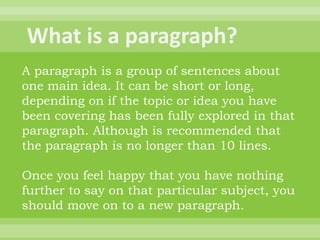Report
Share

More Related Content
What's hot
What's hot (20)
Identifying Topics, Main Ideas, and Supporting Details

Identifying Topics, Main Ideas, and Supporting Details
Viewers also liked
Viewers also liked (13)
ELC 080 - Writing Skill: Thesis Statement & Topic Sentence

ELC 080 - Writing Skill: Thesis Statement & Topic Sentence
Similar to Paragraphs and topic sentences
Similar to Paragraphs and topic sentences (20)
Essay Topic Is intelligence a unitary ability, or are there mul.docx

Essay Topic Is intelligence a unitary ability, or are there mul.docx
More from Sussan Roo
More from Sussan Roo (20)
Paragraphs and topic sentences
- 1. A paragraph is a group of sentences about one main idea. It can be short or long, depending on if the topic or idea you have been covering has been fully explored in that paragraph. Although is recommended that the paragraph is no longer than 10 lines. Once you feel happy that you have nothing further to say on that particular subject, you should move on to a new paragraph.
- 2. The topic of a paragraph is generally introduced by a key sentence. This is called a topic sentence because it contains the central idea of the paragraph. It often -but not always- comes at the beginning of the paragraph. Topic sentence: tells the reader what the paragraph is about. Supporting sentences: add details to the topic sentence. Ending sentence: this concludes or closes the paragraph.
- 3. The topic sentence could be: College is very important. These can be supporting sentences: You learn how to study. Teachers teach you how to organize your work. You learn how to use computers. The supporting sentences can be moved around so that the paragraph is in order or makes more sense. To strengthen your writing, make sure that each of your supporting sentences relates well to the topic sentence. It is not enough to be generally in the same topic area.
- 4. The ending sentence closes or finishes the paragraph. Ending sentences can: a) repeat the topic sentence in a different way b) express how we feel about the topic c) express what we think about the topic. It is important to go to college (repeating topic sentence) I love going to college (expresses feelings) I think college is important for people of all ages (expresses thoughts).